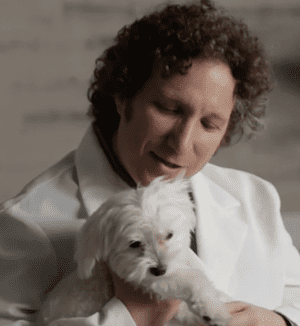If you have a dog, then you’ve probably thought about the food you’re feeding them and whether or not it meets their nutritional needs.
But do you ever consider what happens to that food after they chew it up? Do dogs digest food in a similar way to humans? And what is with your dog throwing up yellow foam sometimes?
It turns out there is a lot of useful information to know about a dog’s digestive system and how it affects their health. Continue reading to learn more.
The Basics Of Dog Digestion
Proper digestion is very important for a dog’s health. It’s how your pup absorbs nutrients from their food.1
A dog’s digestive system hosts an estimated 100 trillion microbial cells. 2 All of these microbes work to digest food and support the immune system.3
You can tell a lot about what is going on with your dog’s digestion by looking at the dog poop color also.
How Long It Takes To Process: Dog Digestion Vs. Human Digestion

The whole process begins the second they put food in their mouth. Here enzymes in their saliva start to dissolve food so that it can be processed in the stomach,4making probiotic chews a potential option to support their digestive health.
Once in the stomach, food is further broken down by gastric acids. This is the first part that differs from humans. That’s because dogs have a more acidic stomach than their two-legged friends. This enables canines to process and dissolve things like bones. Higher pH levels also mean that food moves through the stomach faster than in humans.5
Additionally, a dog’s intestinal tract is shorter than a human’s. That means the food has a shorter distance to travel and that digestion takes less time. All and all, it generally takes a dog around 8 hours to properly digest food whereas it can take humans up to 72 hours. These times can vary for both dogs and humans based on the type and quantity of food consumed.6
Recognizing how long it should take your dog to digest food allows you to assess their intestinal health. Food that is digested in a timely manner and comes out the other end looking solid and healthy is an indication that your dog is eating well and receiving proper nutrients. However, if it takes your dog much less or more time to digest food it might be an indication that they are experiencing digestive issues. Learn more about how to determine this below.
Proper Digestion: Vital To Your Dog’s Health And Well-Being

Size And Breed
Large breed dogs can have softer stool than their smaller dog counterparts. This is because they have larger colons where food spends more time dissolving and breaking down. This also means it can take them longer to digest than smaller dogs.7
Diet
All food goes to the same place. However, all food is not the same. A dog’s stomach can react differently to certain ingredients. For instance, foods high in carbohydrates might affect your dog’s stomach differently than foods high in fat.8
Age
Evidence suggests that dogs continue to absorb nutrients efficiently in old age.9However, older dogs often have different health considerations than young dogs.10
Because some dogs have more sensitive stomachs than others, it’s important to monitor them for digestive issues. Learn more about how to do this below to ensure that your dog is getting everything they need from their food.
Common Digestive Issues In Dogs

Sometimes there might just be an issue with the type of dog food your dog eats. A change in diet can alter your pup’s bowel movements.11,12
Additionally, loose stools can be an indication that your dog may be suffering from a health issue and needs medical attention.13
There are many factors that can change the length and quality of your dog’s digestion. That’s why it’s so important to monitor their internal health. If you are concerned about your dog’s bowel movements or eating habits consult your veterinarian. Our dog vomit color guide can also help identify some digestive problems.
Feeding Your Dog: The Importance Of Your Dog’s Diet
There are many different dog foods available on the market. Each one with its own set of ingredients and nutrients.14
Certain ingredients can have different effects on different dogs. However, there are a few ingredients that can commonly change a dog’s digestion quality and time. These may include:
- Type of protein in the food
- Fiber source
- Levels of fat
- Quality of the ingredients15
Talk to your vet about how to provide the best possible nutrition for your dog.
Old Vs. Young Dogs: Variations In Diet

One thing you can do to help your older dog’s digestion is to feed them smaller portions. This can make it easier on their stomach to digest the food.17
There are special senior dog foods designed with less fat or sodium levels, but speak to a vet before making any changes to their diet.18
Your Dog’s Health: The Importance Of Digestion
There’s a lot to consider when it comes to your dog’s digestion. Digestion time can be a great way to tell if your dog is getting everything they need from their food. Monitoring your dog’s bathroom habits may provide important insight into whether or not they are eating well and receiving proper nutrients.
Consult a veterinarian if you have any concerns about your dog’s digestive health or eating and bathroom habits.
Together, you can ensure that your dog is getting the best possible nutrition for their age and breed.
Disclosure: The Ultimate Pet Nutrition team creates these articles as a way to provide you with the latest information on health and nutrition. Unfortunately, we cannot make specific product recommendations for our website visitors, such as “Nutra Thrive” or “Canine Boost” Please consult with your healthcare provider to determine the best products for you.
~
Pet dogs mean a lot to every owner. They can be your best friend, your closeor even your family. We can make custom pins for our dogs to express our love for dogs. The pins can be hung on clothes and backpacks.
When we work hard outside, we will think of there is a little cutie waiting for us
to go home. Order Now
Sources
1. https://www.petmd.com/dog/nutrition/evr_dg_healthy_dog_food_digestion_prebiotic_probiotic
2. https://todaysveterinarypractice.com/intestinal-microbes-digestive-system-disease-dogs/
3. https://www.akc.org/expert-advice/news/dogs-and-humans/
4. https://www.merckvetmanual.com/dog-owners/digestive-disorders-of-dogs/introduction-to-digestive-disorders-of-dogs
5. https://pawcastle.com/human-canine-digestive-system/
6. https://www.whole-dog-journal.com/health/digestion/the-canine-digestion-process/
7. https://onlinelibrary.wiley.com/doi/full/10.1111/jpn.12507
8. https://www.akc.org/expert-advice/nutrition/best-dog-food-choosing-whats-right-for-your-dog/
9. https://academic.oup.com/jn/article/128/12/2632S/4724470
10. http://www.vetstreet.com/our-pet-experts/what-to-expect-when-your-dog-gets-older
11. http://www.vetstreet.com/the-scoop-on-digestion
12. https://www.akc.org/expert-advice/nutrition/feed-my-dog-raw-food-or-dog-kibble/
13. https://www.petmd.com/dog/nutrition/7-interesting-facts-about-your-dogs-digestive-system
14. https://www.petmd.com/dog/nutrition/evr_dg_the_benefits_of_proper_nutrition
15. https://www.akc.org/expert-advice/nutrition/best-food-for-dogs-with-sensitive-stomachs/
16. http://www.vetstreet.com/our-pet-experts/nutrition-basics-for-your-senior-dog
17. http://www.vetstreet.com/dogs/caring-for-senior-dogs-what-you-need-to-know
18. https://vetnutrition.tufts.edu/2016/03/when-should-i-switch-my-pet-to-a-senior-diet/
Get our best articles straight to your inbox.
Subscribe to The DARling below:
About the author



